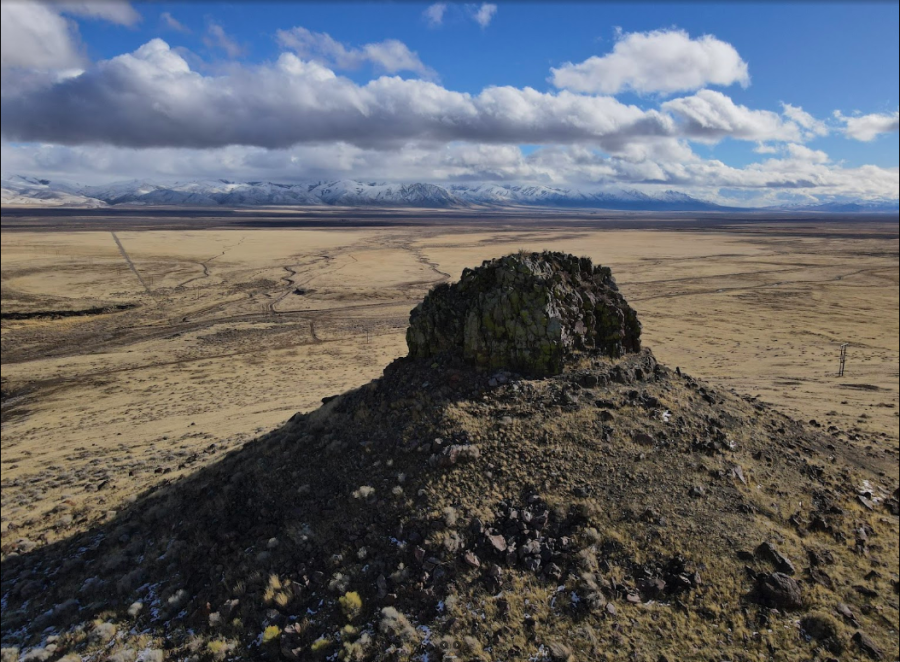Thacker Pass Mine Leads to Environmental Conflict
May 1, 2023
In the high plains of the Nevada Great Basin, 20 miles from the Oregon border, sits an isolated rocky butte known as Thacker Pass. In September 1865, 31 Paiute-Shoshone were massacred by US soldiers, their decomposed bodies were later discovered beside a crescent-shaped rock formation, giving the location its indigenous name “Rotten Moon.”
Today, local inhabitants of the Thacker Pass area are bearing witness to the largest lithium mine project in America. Financially fueled by Ganfeng Lithium, the largest Lithium company in the world, the project has made a seemingly barren desert into a political battle fought between activists, tribespeople and businessmen.
The area has long been occupied by the Paiute and Shoshone people, who lived off this land for food, medicine and hunting. It served in the late-19th century as a hiding refuge for many Natives during the forced relocation to reservations in Oklahoma and elsewhere. Without the pass, the community of the Fort Mcdermitt Reservation along the Oregon/Nevada border would have had their homeland seized from them. Diverse wildlife inhabit the area, including speckled-feather Sage-Grouse birds and Pronghorn Antelope.
It is this history and habitat that critics of the project voice in their ongoing activism. Native groups have occupied the site in addition to a camp squat set up by members of Deep Green Resistance, an aggressive anarchist environmentalist group. Beyond direct action, emergency lawsuits and appeals have been made with no legal response.
In providing for the global demand for lithium, the government has allowed a land full of Native heritage and biodiversity to be excavated for industry. The Thacker Pass Mine, which began construction in March 2023, represents the destructive consequence of ‘green industry’ in the presence of climate change.
The conflict surrounding the mining project has been a decade-long evolution. The wide expanse has been of corporate interest since 2007– when one of the largest Lithium deposits was discovered from surveys. Lithium is a metal that has proved essential in the technological spur of the 21st century. Demand is projected to triple in the next four years. Its application is found in cell phones, computers, nuclear energy and electric vehicles. The growing market of electric vehicles (EVs) is one of the main reasons for the mine’s construction, as the cars run on batteries made from Lithium.
The material is mostly mined in the “Lithium Triangle” of Chile, Bolivia, and Argentina, yet the US is known to have among the largest deposits of lithium. The project therefore presents political benefits, as it allows seemingly green products to be sourced within the United States, instead of relying on imported materials.
Yet the reality is that the mine promotes neither sustainability nor energy independence, but a ‘greenwashing’ effort by corporations. The project is indirectly financed by Ganfeng Lithium, who serves as parent company to Lithium Nevada LLC. Proponents of the project who advocate EVs, nuclear, and other technologies will increasingly rely on resources from foreign exports.
Massive amounts of raw materials are needed to build technologies such as electric batteries, nuclear reactor plants, windmill turbines and more. With this approach, a zero-carbon US means more carbon emissions in foreign countries supporting those technologies.
Thacker Pass will contribute minimally to the US’s international share, which accounts for only 2% of the global lithium market. Even with the growth of lithium production, the majority is processed into batteries in China.
Beyond the simple removal of Lithium metal from the ground, the way in which it is mined is environmentally destructive in a myriad of ways. In accessing the Lithium, situated roughly 400 ft underground, explosives will have to be used, in addition to making space for brine pools that purify the substance.
Demolition of these areas would block wildlife that seasonally seek refuge there. Roughly 5,000 acres of grazing land would be taken from Pronghorn Antelope, along with nesting areas for Golden Eagles. The mine is also partly placed within the Queen River Valley area — a place where historical records show was the site of the Rotten Moon massacre.
The brine pools require an enormous amount of desert groundwater to allow the mine to function, a figure cited by The Times projects details roughly 1,695,000,000 gallons of water to be used annually after 4 years in use. Surrounding ranchers in the area have voiced concern that the massive amount of groundwater used would take from their livestock. The waste, or “backfill” produced by brine pools are projected to remain toxic for more than 300 years.
Opposition to this project has been widely suppressed by the courts and government; emergency appeals rejected, petitions knocked, and occupation protests broken up. While the mine was in planning for years, tribes were given only a few months to have their say. Many local Native American activists of Paiute, Shoshone, and Bannock tribes have organized to create the People of Red Mountain Group, which remains active in fighting the Thacker Pass Mine.
The project is a telling case study for the climate response, demonstrating the pollutants and waste that is produced with the infrastructure supporting “green technology”. Lithium Americas Vice President, Tim Crowley, has optimistically said “We’re answering President Biden’s call to secure America’s supply chains and tackle the climate crisis.”Yet the data projections refute that this mine will benefit the climate crisis — it seems the technology offsets the blame. Consumers may see electric cars and nuclear energy to be the bright green alternatives, yet all the while these alternatives are supported by industries that desecrate the land.
More Lithium mining projects are being announced as demand makes use of the US’s large ground reserves. Plans have been made in California, Tennessee, and North Carolina, as well as southeast Oregon. Near the town of McDermitt, a lithium reserve has been confirmed as the largest deposit in the country, spurring new plans in the last month.
Lithium mining will be something consumers must consider in their next purchase of electronics or EV’s. “Environmentally-friendly” is increasingly becoming a marketing tactic, as opposed to genuine statements. The hard truth of climate action will be a wide reduction in humanity’s energy usage, not disingenuous attempts at providing industry alternatives.



